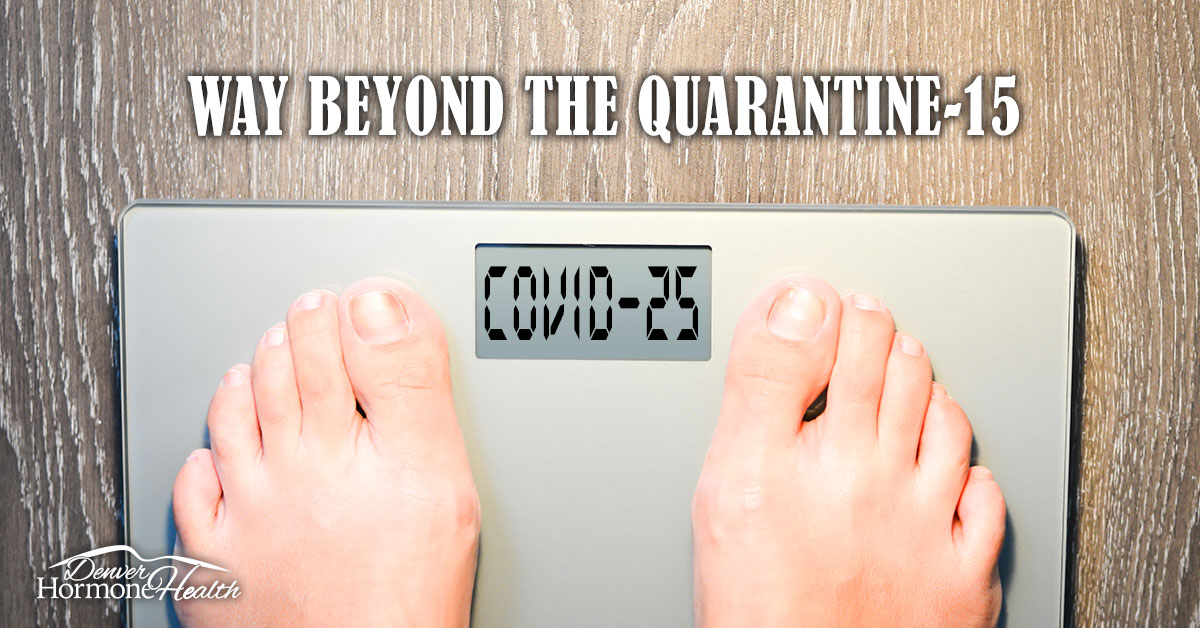WEIGHT GAIN; BLAME YOUR HORMONES

If ever there was a time that created a collective weight gain panic, this is it. For weeks we were sheltered inside trying to get through day after day of feelings including panic, loneliness, sadness, and boredom, amongst others. Zoom saw a boom in bodies sheltered under sweats and jammies. From March 8-March 15, online views for homemade bread increased 342%, how to make banana bread by 171% and how to make sourdough starter-518%. Fat memes became pandemic. Curves fattened before the curve flattened.
SOCIAL DISTANCING FROM THE SCALE
Covid-crisis eating was understandable. As was gaining weight from non-stop snacking and becoming best friends with the Door Dash delivery person bringing you pizza and fattening meals you’d normally never chow down on. But being overweight is a long-time crisis. The obesity rate in the US now tops 40%. Super-sizing everything has led to super-sizing of the national waistline. Belly fat has bulged beyond historical norms. Toilet paper may have been scarce, but people never stayed six feet away from the ice cream freezer or chips aisles.
SCALING UP DIET AND EXERCISE DOESN’T ALWAYS DO IT
But not everyone threw weight gain caution to the wind. And yet, they too gained weight. And this weight gain conundrum existed long before now. In 2018, the US weight loss industry was worth a staggering $70.3 billion. This figure included couch potatoes with sour cream, cheese and bacon, but it also included the millions of people for whom diets did nothing to help them lose weight. And they tried every diet there was. Every crazy workout out there. Approximately 45 million adults in the United States (about 14% of the population) are members of a gym. But no number of crunches or miles in spin class led to significant weight loss. What the frustrated never knew was that in packing on puzzling pounds, the real enemy they were battling was unbalanced hormones.
A BIG FAT HORMONE PROBLEM
Unbalanced hormones and weight gain go hand in hand. When your hormones are out of balance, losing weight or maintaining weight is almost impossible. Hormones are important for regulating most major bodily processes, so a hormonal imbalance can affect a wide range of bodily functions. Hormones help to regulate heart rate, blood pressure, sleep, reproductive cycles and sexual functions, growth and development, mood and memory and yes, weight. Hormones cause willpower to go by the wayside and food cravings to call the shots. The ability to metabolize food for fuel is directly connected to your hormones. Some of the worst weight gain hormone culprits are cortisol, insulin, estrogen, testosterone and thyroid. Even a slight disruption in the levels of any of these hormones can cause the body to put on weight and fight like lard to keep it there.
FIRE UP YOUR HORMONES
The medical professionals at Denver Hormone Health have just what it takes to reset hormone levels that have gone awry. With years of experience treating all types of hormone imbalance issues, DHH professionals are experts when it comes to weight management. At DHH they understand what you have been going through and have developed a novel Hormonal Weight Loss Support Program that has successfully helped patients lose, and more importantly, keep the weight off. The program includes bioidentical hormone replacement therapy, B6, B12 and lipotropic injections, plus exclusive, highest quality weight management supplements. When combined with healthy diet and exercise—which DHH nutrition and fitness experts are there to help with, patients have reported having more energy, faster metabolisms, better weight loss and stronger immune systems. DHH physicians do a full analysis including simple blood tests that pinpoint your exact hormone levels. This allows them to customize a unique treatment plan tailored to each patient’s individual needs. Call Denver Hormone Health for an appointment now. Struggling with weight gain? Don’t wait a minute more.
